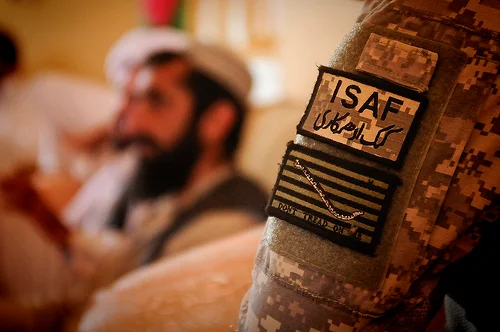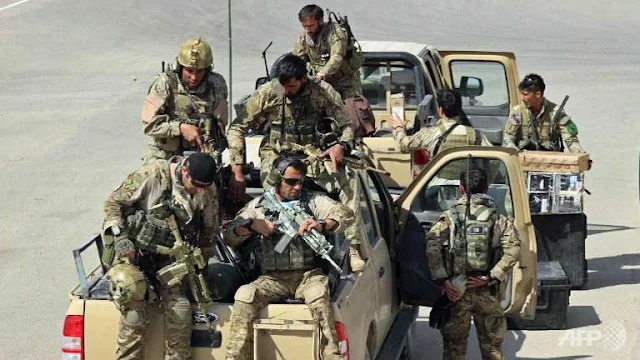It has to be accepted that the degree of insecurity in Afghanistan is the worst it has been for several years; it is requiring the Afghan government to rely on militias of thoroughly dubious reputation, and is also leading NATO military planners to reconsider their rate of withdrawal.
By Paul Rodgers
Summary
This briefing has as its focus the security
situation in Afghanistan close to a year since the election of Ashraf Ghani as
President, with Abdullah Abdullah subsequently appointed Chief Executive, and
as US-led foreign forces withdraw down to barely 13,000 troops from a peak of
over 130,000 four years ago. It discusses the prospects for progress, the
problems most evident and the possible role of Islamic State (IS), while
placing most emphasis on the Taliban and whether they will have a role in
future Afghan governance.
Image Attribute: Slideshare.net
The Ghani Administration and the Coalition
Drawdown
In May 2015 briefing, we have assessed
the extent to which IS was looking to operate beyond Iraq and Syria, whether
this be in the form of existing groups pledging allegiance or IS itself
directly exporting its paramilitary and organisational abilities. One focus was
on Afghanistan where there had been reports of IS personnel directly aiding
Taliban militias in their assault on the northern city of Kunduz. This raised
questions about the widespread assumption that IS’s essentially
internationalist orientation would in due course bring it into conflict with
the far more nationalist and ethnically focused Taliban. Events since then
suggest that the Ghani government and some of its international partners may be
responding with overtures to the Taliban in anticipation of a growing IS
challenge.
Political progress since the Ghani-Abdullah
power-sharing agreement of September 2014 has been slow and laboured. The Lower
House of the Afghan Parliament finally approved sixteen ministerial candidates
in April after many months of negotiations, but the Defence portfolio was not
filled. There has also been controversy over the possible decision to postpone
parliamentary elections for a year to allow for electoral reform. President
Ghani has engaged in vigorous international diplomacy since taking office last
year and, while the relative stability of his administration has been welcomed
by coalition partners, the security situation within the country remains deeply
problematic.
After Barack Obama won the 2008 US
Presidential Election he eventually agreed to a surge of some 30,000 additional
US troops in 2010, taking the US total to over 100,000, with more than 30,000
troops deployed by other countries, mainly NATO member states. The surge was
not intended to put the troops in a position to defeat the Taliban and other
armed opposition groups, but to negotiate withdrawal from a position of
strength to ensure that the Taliban and others would have minimal roles in the
country’s future.
Image Attribute: NATO Website
In practice, the surge had little impact in
limiting Taliban capabilities and after his re-election in 2012 Obama
determined to withdraw the great majority of troops by the end of 2014, with
other coalition members following suit. All that would be left would be
training and support missions and, though not officially acknowledged, forces
capable of mounting drone attacks and Special Forces raids. The intention of
this ongoing presence was twofold: firstly, to ensure that the Afghan National
Army (ANA) was strong enough to ensure security, even in the unstable Helmand
and Kandahar provinces in the south that were traditional Taliban strongholds;
secondly, to have the capability to respond to any return of al-Qaida
paramilitaries with an international agenda.
The 2015 “Fighting Season”
The common use of the term “fighting season”
in Afghanistan refers to the impact of climate on unconventional warfare and
runs primarily from May through to late October, starting with the end of the
opium poppy harvesting season and running through to the onset of winter
weather. This does not imply that the rest of the year is calm, least of all in
urban areas, but the intensity of conflict is normally far higher in this
period. The 2015 season so far has been marked by increased violence, including
the substantial fighting between the Taliban and government forces around the
city of Kunduz in the north, not a part of the country in which the Taliban is
traditionally strong.
Image Attribute: Afghan soldiers during the planning of a
major Afghan-led operation in Helmand province (library image) [Picture:
Corporal Jamie Peters, Crown copyright]
In Helmand Province, where ANA forces now
seek to control the province without US or UK involvement, there are reliable
reports that casualties are 50 percent higher than last year and ANA units have
given up conducting counter-insurgency patrols while Taliban militias have
extended their network of roadblocks. Similar problems have been experienced in
other parts of Afghanistan and one of the results is that the government has
had to rely on up to 30,000 men from so-called “militia forces” known as Afghan
Local Police (ALP) – essentially local guns-for-hire. The ALP have acquired a
very poor reputation, with accusations of fraud, theft, rape, looting, drug
trafficking and torture, so much so that there are some reports that Taliban
entry into towns under ALP occupation has actually been welcomed by local
people.
Image Attribute: Afghan special forces arrive at the airport
as they launch a counter-offensive to retake the city of Kunduz from Taliban
insurgents, September 2015. (AFP PHOTO/Nasir Waqif)
On 28 September 2015 the Taliban launched a major offensive in North Afghanistan resulting in the overrun of city of
Kunduz. The fact that some hundred Taliban fighters were taking over a major
urban centre- an area which was held by 7000 regular Afghan troops, in less
than 24 hours, is not only a military debacle for the Afghanistan National
Security Forces (ANSF) but also an embarrassment for the provincial
authorities. At the very core of the symbolism of Kunduz
lies the semblance of a tectonic shift in the Taliban’s self-conception and
especially self-portrayal- representing an inclusive movement. However, one
should also shed light on the composition of the ‘Taliban forces’ involved in the
takeover of Kunduz and also about the other groups which were joining the
fighting of the Islamists insurgents.
Islamic State in Afghanistan
The deterioration in security, now extending
well beyond the regions of traditional Taliban influence such as Helmand and
Kandahar, is most likely the main reason why the United States and its NATO
partners are reviewing their commitment to the country, although this is no
doubt compounded by the indications that IS paramilitaries do have an interest
in establishing a long-term presence in the country. The precise details of IS
involvement in the fighting around Kunduz in May 2015 was not clear but since then there have been clashes
between IS and Taliban paramilitaries elsewhere in the country and US military
sources confirmed at the end of the month that IS was recruiting supporters
within the country, most likely in opposition to the Taliban.
The US' original intention was to draw down
forces from 9,800 to a very few thousand concerned with training, support and
protection of the US Embassy in Kabul and other civil locations. Other NATO
states were planning similar moves from their lower base of around 3,400 troops
in total. This would have given a combined total NATO presence of perhaps 3,000
compared with 13,200 in total at present, though this would not include private
military contractors who could well have many thousands of personnel operating
in low profile roles.
This whole process is now subject to review
with unconfirmed reports at the end of May that it was proposed to establish a
long-term presence in or near Kabul. This would most likely outlast President
Obama’s second term, even though his stated intention remains to withdraw all
combat forces by the end of that period. Much will depend on whether IS
paramilitaries continue to increase their presence in the country, but this
will also put substantial pressure on the Taliban, as it finds itself in
competition with an external force which is more radical, brutal and, as some
would see it, more effective.
Prospect of Negotiations
It would be reasonable to summarise the
security situation in Afghanistan as deteriorating, despite the welcome that
Western states have given to the more technocratic President Ghani. From that
perspective, there would appear to be little point in Taliban elements being
prepared even to consider negotiations for a future role in governance, yet
there are signs of a change in attitude, possibly down to the unexpected
pressure being exerted by IS elements. There have been two specific recent
examples in addition to informal talks which have been reported over several
years, often facilitated by Gulf States.
In late May, a Tehran-based news agency with
close links to the Iranian Revolutionary Guard Corps reported that there had
been a significant visit from a high-level Taliban group to hold discussions
with Iranian security and military officials. This was not the first such visit
and appears to indicate a softening in relations between Iran and the Taliban.
It follows two decades of animosity if not outright opposition, which reached
its original peak with the murder of nine Iranian diplomats by the Taliban, an
attack which took Iran close to war in 1998.
The rapprochement may be partly because Iran
sees the Taliban having a role in Afghan governance and seeking influence if
that should happen, coupled with the recognition that the Taliban may end up
fighting IS elements, which Iran also considers its enemy. On the Taliban side
it is likely to be predicated primarily on making friends with a powerful and
stable neighbouring country which, in addition, has considerable day-to-day
influence in western Afghanistan where the Taliban are weak.
The second example may turn out to be even
more significant. It was reported in early June that the Norwegian Government
had facilitated a meeting between influential Taliban officials and a
delegation of women parliamentarians from Kabul. This is part of a long-term
Norwegian initiative to increase dialogue, but may be the most significant so
far given the nature of the Afghan delegation. Taliban sources confirmed the
meeting while denying any official status. This denial is standard practice for
meetings taking place at what is an early stage in such a process.
Conclusion
It has to be accepted that the degree of
insecurity in Afghanistan is the worst it has been for several years; it is
requiring the Afghan government to rely on militias of thoroughly dubious
reputation, and is also leading NATO military planners to reconsider their rate
of withdrawal. One of the main concerns is the risk of IS substantially
increasing its influence in the country, especially among younger Taliban supporters
disenchanted with the rate of progress of the movement, including the absence
from public view for well over a decade of the leader, Mullah Omar.
If, though, it is the case that this is also
putting elements of the Taliban leadership under pressure, then this may be one
of the main motivations for increasing the level of diplomatic interchange,
whether formal or informal, with the Norwegian and Iranian meetings being
recent examples. That may give some hope for greater stability, but meanwhile
the “fighting season” continues with considerable loss of life.
About The Author:
Paul Rogers is Global Security
Consultant to Oxford Research Group (ORG) and Professor of Peace Studies at the
University of Bradford. His Monthly Briefings are available ONLINE
This briefing has been updated by IndraStra Global Editorial Team
with respect to the current events.



![Image Attribute: Afghan soldiers during the planning of a major Afghan-led operation in Helmand province (library image) [Picture: Corporal Jamie Peters, Crown copyright] Image Attribute: Afghan soldiers during the planning of a major Afghan-led operation in Helmand province (library image) [Picture: Corporal Jamie Peters, Crown copyright]](https://blogger.googleusercontent.com/img/b/R29vZ2xl/AVvXsEjZCEU2aeRMYgkrA3PYlLx3RpF7JPRk0r8xFrWJKqIga3fZ045blYVo0K1wFXko0ynNEYyqA_Qcq68DT66M_bA4m2PIKZaDg5uyVsmJtWH5Pf30eeYUkam-H5EaQk39XxXWeaAu0Ydllck/s640-rw/AMOCCCT-2012-222-040.jpg)




















